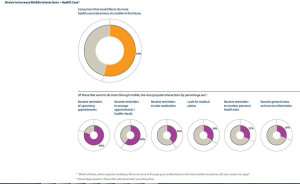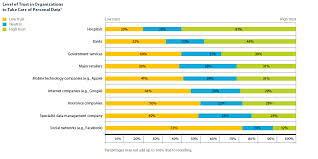Most people (54%)  want their mobile phones to enable health care interactions, according to Mobile Thought Leadership, a paper from FICO that summarizes data from a survey conducted with health citizens around the world.
want their mobile phones to enable health care interactions, according to Mobile Thought Leadership, a paper from FICO that summarizes data from a survey conducted with health citizens around the world.
FICO conducted research among 2,239 adult smartphone users in the UK, Australia, Brazil, China, France, Germany, India, Italy, Japan, Korea, Mexico, Russia, Turkey and the United States. The data discussed here in Health Populi refer to a subset covering just U.S. consumers.
Among the one-half of consumers interested in doing more health care interactions via mobile in the future, the most popular options are: receiving reminders of appointments, 80%; receiving reminders to arrange appointments, 60%; receiving reminders to take meds, 40%; looking for medical advice, 34%; receiving reminders to monitor personal health risks, 32%; and, receiving general news and service information, 30%.
To look for medical advice, most U.S. consumers (57%) prefer to go online, via a computer, followed by visiting a health professional in person (23%), calling the provider or using websites through mobile devices (5%), or using an app on a mobile device (4%). The process of looking for medical information is termed as a “pull communication” in FICO’s language. So seeking health information via mobile platforms is still a very small proportion of all health search activity.
With respect to health care, FICO points out that health care has been “slower to react” to mobile technology opportunities, but sees potential for mobile in the use of “alternative advice channels.”
 Health Populi’s Hot Points: FICO also found that more consumers trust hospitals to take care of their personal health information than any other industry – slightly more than banks, and well above insurance companies, governments, retailers, mobile tech companies (with Apple named as an example in this category), internet companies (with Google named as an example), specialist data management companies, and in last place — social networks (e.g., Facebook). The second chart illustrates these findings.
Health Populi’s Hot Points: FICO also found that more consumers trust hospitals to take care of their personal health information than any other industry – slightly more than banks, and well above insurance companies, governments, retailers, mobile tech companies (with Apple named as an example in this category), internet companies (with Google named as an example), specialist data management companies, and in last place — social networks (e.g., Facebook). The second chart illustrates these findings.
As an advisor to stakeholders in health care, I spend a lot of time these days with a focus on digital health and mobile platforms and how people (consumers and providers alike) are using these technologies. This report fascinates me for two reasons: first, the data findings (both domestically and globally, where the trends and consumer interests are also up for mobile health around the world).
But second – and perhaps more intriguing to me – is the fact that FICO conducted this survey. FICO is best-known by regular people as the credit scoring company. The acronym for the Fair Isaac Corporation, FICO was formed in 1956 by Bill Fair, an engineer, and Earl Isaac, a mathematician, who believed that the smart use of data could improve business decisions. In 1957, Conrad Hilton engaged Fair and Isaac to build a billing system for Carte Blanche (one of the world’s first credit cards). In 1958, Fair Isaac built the first credit scoring system for American Investments – the only one of fifty major lenders interested in the concept.
Back to the chart: 56% of consumers have “high trust” for hospitals to manage their personal health information; 24% of consumers have high trust for “specialist data management companies” to manage their personal health information.
Today, FICO’s trademarked tagline is “Make every decision count.” The lifeblood for companies like FICO is data. As mobile phones continue to collect more data about you (health care and otherwise), FICO and other data analytics companies will be able to get increasingly granular about market segmentation, customized responses, and, yes, credit scoring for finance and health.




 I am so grateful to Tom Lawry for asking me to pen the foreword for his book, Health Care Nation,
I am so grateful to Tom Lawry for asking me to pen the foreword for his book, Health Care Nation,  Thanks to Feedspot for naming this blog, Health Populi, as a
Thanks to Feedspot for naming this blog, Health Populi, as a